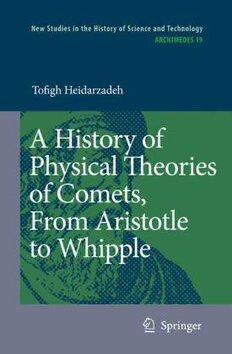Download A History of Physical Theories of Comets, From Aristotle to Whipple PDF Free - Full Version
Download A History of Physical Theories of Comets, From Aristotle to Whipple by Tofigh Heidarzadeh in PDF format completely FREE. No registration required, no payment needed. Get instant access to this valuable resource on PDFdrive.to!
About A History of Physical Theories of Comets, From Aristotle to Whipple
The book describes the major physical theories of comets in the past two millennia. It demonstrates the evolution of ideas about the nature, position, motion and physical constitution of comets from Aristotle to Whipple. Unlike the available works on the history of comets, which either illustrate relatively short periods in the history of physical cometology or portray a landscape view without adequate details, the present study focuses on details of each theory. It also investigates the interaction between observational and mathematical astronomy, and the physical sciences in defining the properties of comets. Ideas about the astrological aspects of comets are not considered in this study. Also, topics concerning the motion of comets are explained to the extent that is helpful in illustrating their physical properties. Although the present study is mainly focused on the physical theories of comets, its results will be relevant to studies in the history of geology, planetary science, and astrology. On the other hand, those results may initiate new studies about educational practices for physics and astronomy in post-Newtonian Europe, the ways that different parts of Newton's physical, astronomical and cosmological ideas evolved after him. Also, the debates about the constitution and chemical properties of comets in the post-Laplacian era may trigger new researches about possible influence of cometary studies on the foundation of astrophysics.
Detailed Information
| Author: | Tofigh Heidarzadeh |
|---|---|
| Publication Year: | 2008 |
| ISBN: | 9789048178421 |
| Pages: | 283 |
| Language: | English |
| File Size: | 5.346 |
| Format: | |
| Price: | FREE |
Safe & Secure Download - No registration required
Why Choose PDFdrive for Your Free A History of Physical Theories of Comets, From Aristotle to Whipple Download?
- 100% Free: No hidden fees or subscriptions required for one book every day.
- No Registration: Immediate access is available without creating accounts for one book every day.
- Safe and Secure: Clean downloads without malware or viruses
- Multiple Formats: PDF, MOBI, Mpub,... optimized for all devices
- Educational Resource: Supporting knowledge sharing and learning
Frequently Asked Questions
Is it really free to download A History of Physical Theories of Comets, From Aristotle to Whipple PDF?
Yes, on https://PDFdrive.to you can download A History of Physical Theories of Comets, From Aristotle to Whipple by Tofigh Heidarzadeh completely free. We don't require any payment, subscription, or registration to access this PDF file. For 3 books every day.
How can I read A History of Physical Theories of Comets, From Aristotle to Whipple on my mobile device?
After downloading A History of Physical Theories of Comets, From Aristotle to Whipple PDF, you can open it with any PDF reader app on your phone or tablet. We recommend using Adobe Acrobat Reader, Apple Books, or Google Play Books for the best reading experience.
Is this the full version of A History of Physical Theories of Comets, From Aristotle to Whipple?
Yes, this is the complete PDF version of A History of Physical Theories of Comets, From Aristotle to Whipple by Tofigh Heidarzadeh. You will be able to read the entire content as in the printed version without missing any pages.
Is it legal to download A History of Physical Theories of Comets, From Aristotle to Whipple PDF for free?
https://PDFdrive.to provides links to free educational resources available online. We do not store any files on our servers. Please be aware of copyright laws in your country before downloading.
The materials shared are intended for research, educational, and personal use in accordance with fair use principles.

